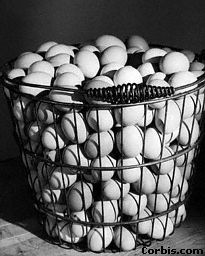change&flow |
|
| No. 5 December 15th, 2001 |
|
[prev] [next]
|
Simultaneous Pecking from inside and outside the eggshell |
 "Sottaku Doji" is a famous Zen phrase, that translates literally as "simultaneous pecking from inside and outside (the eggshell)". It desciribes how the pecking of the baby chicken that tries to break through it's shell to be born, is perfectly met by the pecking of the mother hen, that helps to break the shell from outside. "Sottaku Doji" is a famous Zen phrase, that translates literally as "simultaneous pecking from inside and outside (the eggshell)". It desciribes how the pecking of the baby chicken that tries to break through it's shell to be born, is perfectly met by the pecking of the mother hen, that helps to break the shell from outside.This expression is used as a metaphor for the perfect interaction of Zen teacher and student in their mutual effort to question and express the truth. Where this interaction takes places, it leads to a breakthrough - liberation inside life and death. 
Now, how do teacher and student interact in realtiy? Too often it seems, that the aim, direction and timing of the student's and the teacher's penetrating investigations are completely different. The student is dissatisfied: Not only will the teacher not reply to his existantial doubts about life and death, he won't even reply to his greeting: "Good morning!" How is he supposed to learn from such a teacher? Burning with anger, he is smoldering inside his own eggshell.  The teacher, on the other hand, turns the key in his unsuccesful try to start the student's engine of practice. When the engine finally starts working, the teacher tries to give gas: Only to find the engine striking again. Once the car gets moving, it runs to the right when the teacher turns the handle left, and to the left, when the teacher tries to go right. The teacher steps on the break, but that - of course - won't work either... When this does not lead to a great accident, the teacher might still find one morning that his "car" isn't there anymore - the student has escaped over night. Or it is the teacher who trashes the car that won't run the way he is steering. And even when teacher and student put up with each other as best as they can, the student might not represent more than a piece of chewing gum sticking to the sole of the shoe of the teacher.  Even though the ideal student-teacher relationship is expressed in words like "simultaneous pecking from inside and outside the eggshell", in reality more often than not it is a relationship between human beings that are just as deluded as any other humans. And although the relationship of teacher and student in Zen is about communicating the truth that transcends human sentiments, when student and teacher relate as humans, at times they will quarrel and hurt each others feelings. In this respect, the student-teacher relationship does not differ at all from any other relationship in human society.
Even though the ideal student-teacher relationship is expressed in words like "simultaneous pecking from inside and outside the eggshell", in reality more often than not it is a relationship between human beings that are just as deluded as any other humans. And although the relationship of teacher and student in Zen is about communicating the truth that transcends human sentiments, when student and teacher relate as humans, at times they will quarrel and hurt each others feelings. In this respect, the student-teacher relationship does not differ at all from any other relationship in human society.The student one the one hand must try to be a perfect student of an imperfect teacher. The teacher on the other hand has to take full responsibility for the growth of the student - just like a carpenter is completely responsible for what he does with a piece of wood. This in itself is something that transcends human sentiments of gain and loss, contracts of give and take. I want to study the true relation of student and teacher anew, keeping in mind that "the true teacher is Zazen". |
|---|